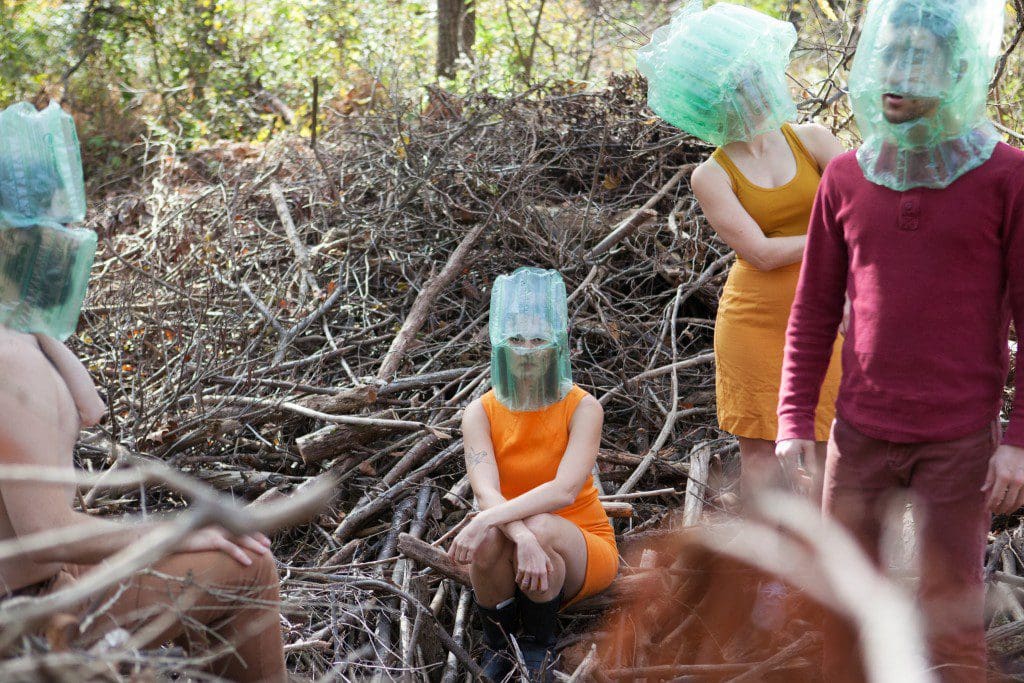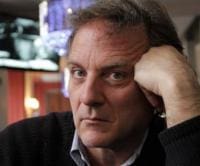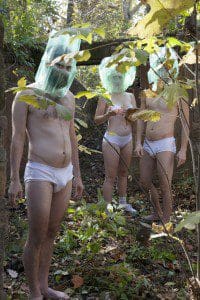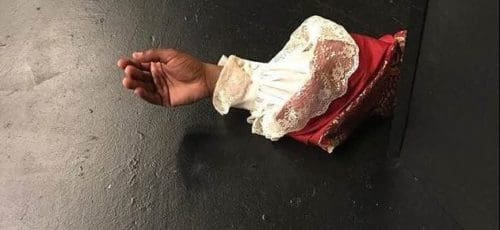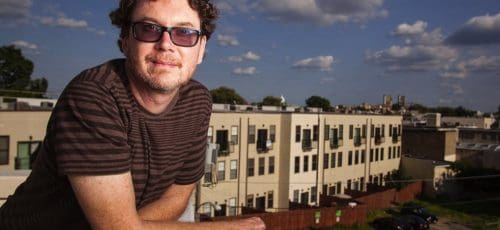The Unprecedented Universe of O Monsters First Draft
Whit MacLaughlin is on his way to a tech rehearsal for his company’s latest production, O Monsters First Draft (tickets/info), yet has graciously taken the time to talk with me despite only being able to hear me through one headphone. “The world makes itself up as it goes along, it’s self-generated,” the artistic director of New Paradise Laboratories asserts.
Over the course of his commute MacLaughlin broke down some of the headier ideas that have fueled the production. Though they may be lofty ideas that are difficult to pin down, O Monsters First Draft is not a lecture or a philosophical treatise. “I’m not a philosopher, but I enjoy the stuff and enjoy thinking about all this crazy wonderfully cosmic stuff,” MacLaughlin tells me. “That’s why we make this, to blow our own minds.”
O Monsters First Draft invites audiences to imagine the world separate from our human understanding of it—and proposes how humans might exist in such a world. The Kissimmee family at the center of the show may seem recognizable, but they are fundamentally—perhaps biologically—different from us.
In searching for this idea of non-human perspectives, NPL drew inspiration from speculative fiction and the contemporary philosophical movement speculative realism, which in turn led them to explore examples of contingency and the unprecedented. They welcomed elements of chance to intrude into their creative processes, and the humanly indefinable result is a fitting show for the experimental theater company’s twentieth year of existence.
Below are some introductions to the concepts we discussed. Let these metaphysical musings set your creative gears turning.
Speculative Realism
“The universe in speculative realism is not a box of laws according to which everything behaved in lockstep. It’s a thing that makes itself up as it goes along, and though the laws of the universe seem stable to us now we have to admit that they probably evolve,” MacLaughlin explains. Speculative realism seeks to overturn previously held philosophical notions that favor human perspective. It posits that we as humans cannot logically deduce with one hundred percent certainty that something is going to happen simply based on our sense of precedent. Our sense of probability inevitably falls short of possibility.
Ancestrality
A term from philosopher Quentin Meillassoux, ancestrality describes everything that occurred before the emergence of the human species. What MacLaughlin finds interesting about this concept comes from thinking about and anticipating mutation: “If you had been standing around watching human beings develop back in the day—hominids moving towards Cro-Magnon—you probably wouldn’t have been able to predict the advent of consciousness,” he asserts, paraphrasing Meillasoux. “It was happening, but it appeared as an unprecedented thing and something deep in the problem of consciousness makes it impossible to predict the unprecedented.”
An Indifferent/Benevolent Universe
“I have trouble wrapping my own head around this especially as it has something to do with living, but I think what is safe to say, and what I find really interesting, is that it recharacterizes everything in the world,” MacLaughlin offered, perhaps sensing my tentative grasp on the subjects at hand. “By that I mean the fact that we’re here doesn’t need a benevolent force making that possible. It’s not like somebody has veered asteroids away from hitting the earth, but after billions of years the earth is still here, so an indifferent universe in some ways becomes a benevolent one simply by virtue of the fact that you’re here.”
The Knowable and the Unthinkable
“I think we’re able to imagine extinction, but it’s hard to imagine a scenario that hasn’t already happened in some way,” MacLaughlin posits. This idea, he explains to me, is central to the premise of O Monsters First Draft. NPL is seeking a means of imagining the possible, not just the probable. Their eyes are set beyond what we expect to what is unknown, unprecedented, maybe monstrous. “The horizon between that which is knowable and that which is unthinkable is the horizon of horror, and horror stories are where the unthinkable world slowly leaks into the world we know and love, the one that exists for us.”
—Hugh Wilikofsky

